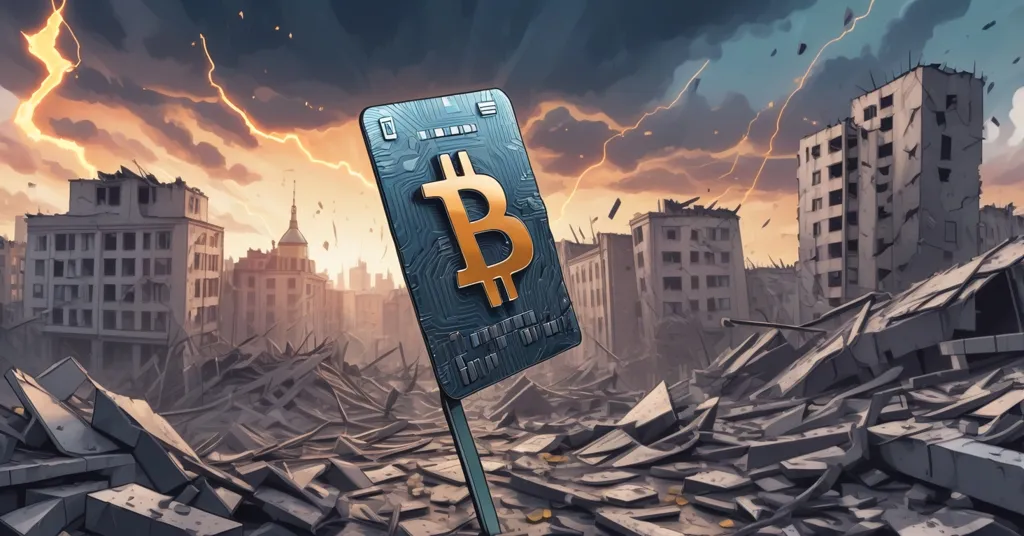Weld Money Shuts Down in Ukraine: War and Regulatory Chaos Force Crypto Card Exit

Crypto Card Provider Weld Money Shuts Down in Ukraine Amid War and Regulatory Turmoil
Weld Money, a Ukrainian fintech offering crypto-linked payment cards, has pulled the plug on its operations in Ukraine, citing military restrictions and regulatory uncertainty fueled by the ongoing war with Russia. This shutdown, with a deadline for users to withdraw funds by June 30, adds to a worrying exodus of crypto businesses from a nation once seen as a promising hub for blockchain innovation, now battered by conflict and policy gridlock.
- Weld Money Closure: Terminating services in Ukraine, urging fund withdrawals by June 30.
- Core Reasons: War-driven military limits and regulatory chaos in Ukraine.
- Industry Trend: Joins Kuna and Trustee Plus in exiting amid similar pressures.
Weld Money’s Downfall: From Innovation to Exit
Founded five years ago, Weld Money started in traditional finance before making waves in 2022 by partnering with Unex Bank to roll out crypto-linked payment cards. These cards, tied to exchanges like WhiteBIT and Huobi (now HTX), let users spend stablecoins—cryptocurrencies pegged to fiat like the U.S. dollar for price stability—such as USDT, USDC, BUSD, and DAI through Mastercard for everyday transactions. It was a slick bridge between digital assets and real-world spending, a lifeline for Ukrainians looking to integrate crypto into daily life. But that vision has crumbled. In a blunt Twitter post, the company dropped the bombshell:
$WELD Money are shutting down due to military & regulatory limits in Ukraine. Please withdraw funds by June 30 from all wallets & cards.
Signs of trouble weren’t hard to spot. Since March, users have been grumbling about service hiccups, with delays and disruptions becoming a headache, as noted by Forklog, a Russian-language crypto news outlet. Were cards completely frozen, or were withdrawals just bottlenecked? Hard data is scarce, but in typical fintech shutdowns, it’s often a mix of both—servers go offline, transactions stall, and customers are left scrambling. For Ukrainian crypto users, already grappling with wartime uncertainty, this is salt in the wound. For more details on this closure, check out the latest report on crypto card provider terminations in Ukraine.
War’s Toll on Crypto Operations: A Financial Lockdown
The war with Russia, escalating since the 2022 invasion, has turned Ukraine into a hostile environment for businesses—crypto or not. Under martial law, think of it as a financial lockdown: restrictions on cross-border money flows, banking freezes, and skyrocketing operational costs have kneecapped companies like Weld Money. Supply chains are fractured, and the sheer unpredictability of running a fintech in a conflict zone means one day’s plan could be tomorrow’s impossibility. It’s not just about keeping servers running; it’s about navigating a maze of wartime rules that can choke financial transactions overnight. Insights into these broader disruptions can be found in discussions on war’s impact on fintech in Ukraine.
This isn’t a solo act. Ukraine’s crypto sector is bleeding firms at an alarming rate. Kuna, a major digital asset exchange, folded in March 2025, facing accusations of tax evasion, with its website forcibly taken down by Ukraine’s cybersecurity agency, the State Service of Special Communications and Information Protection, on a court order pushed by the Economic Security Bureau. Kuna’s founder, Mikhail Chobanyan, called it quits with a grim Telegram message:
I have decided to stop all commercial activities.
Not far behind, Trustee Plus, a crypto wallet provider, stopped accepting new registrations in Ukraine on May 20, 2025, pointing to a glaring “lack of legal certainty.” Their statement didn’t mince words:
There are many reasons, but the most significant is the lack of legal certainty.
For the uninitiated, legal certainty means having clear, predictable rules to operate under—without it, businesses are playing regulatory Russian roulette. Trustee Plus has since shifted focus to the European Union, leaving local users high and dry. Let’s be real: Ukraine’s crypto scene is getting pummeled, and it’s not just the war to blame. Community perspectives on this trend are explored in forums like Reddit discussions on war’s effect on Ukraine’s crypto industry.
Regulatory Quagmire: A Chokehold on Innovation
Peacetime Ukraine was a bright spot for tech and fintech in Eastern Europe, often ranking high in global crypto adoption per Chainalysis reports. Pre-war, blockchain startups thrived here, fueled by a tech-savvy population and a government that seemed open to digital assets. But regulatory clarity? That’s been a pipe dream. The “On Virtual Assets” bill, meant to define crypto as property and set licensing rules for exchanges, has been gathering dust, with fingers pointed at President Volodymyr Zelenskyy’s office for stalling progress. It’s not just inaction—there’s active deterrence. In April 2025, Ukraine’s securities regulator floated a punishing 18% tax on crypto income, alongside hiking the military fee from 1.5% to 5%. Ukraine’s tax hammer isn’t just heavy—it’s swinging blindfolded. For updates on this legislative stagnation, see the latest on Ukraine’s delayed crypto regulations and Virtual Assets bill.
Playing devil’s advocate, you could argue the government is in a bind. War chews through budgets, and Ukraine’s defense needs are dire—estimates suggest billions monthly to sustain military efforts. Tapping crypto, often viewed as a shadowy frontier, for revenue makes sense on paper. An 18% tax and boosted fees could fund critical operations when every hryvnia counts. But here’s the rub: this short-sighted cash grab risks gutting a sector poised to drive post-war recovery. Crypto could attract foreign investment and power decentralized solutions for a battered economy. Why not offer temporary tax relief or a regulatory sandbox—a safe zone for firms to test innovations under lighter rules—to keep players like Weld Money in the fold? Instead, we’re watching a potential blockchain powerhouse slip away. Context on these ongoing policy struggles is available through reports on Ukraine’s crypto regulation challenges in 2025.
Stablecoin Risks: A Hidden Fracture?
Weld Money’s reliance on stablecoins like USDT and USDC for payments adds another wrinkle. These tokens promise stability by being backed 1:1 with fiat reserves, but globally, they’re under fire for murky transparency. Take Tether (USDT), the biggest stablecoin by market cap—controversies over whether it’s fully backed by dollars have spooked regulators worldwide. In a war-torn economy like Ukraine’s, where liquidity crunches and currency devaluations are real threats, any stablecoin wobble could amplify risks. Did this play a quiet role in Weld Money’s collapse, beyond the local mess? The company points to military and regulatory limits, but global scrutiny on stablecoin providers, who often offer zero tailored support during crises, can’t be ignored. It’s a dark side of crypto’s promise—when the “stable” part falters, users pay the price. Background on Weld Money’s specific challenges can be explored via detailed coverage of their shutdown reasons in Ukraine.
Bitcoin Strategic Reserve: A Glimmer of Hope?
Amid the wreckage, there’s a flicker of optimism. Reports suggest Ukraine is exploring a Bitcoin strategic reserve, akin to El Salvador’s bold move to stockpile BTC as a national asset. While details are thin—no word on size or timeline—this could signal a long-term bet on crypto as a financial lifeline, especially for a country facing economic isolation. Bitcoin, with its decentralized nature, could offer resilience against traditional banking disruptions caused by war. For us Bitcoin maximalists, it’s a nod to BTC’s unique role as “digital gold” for nations in crisis. That said, altcoins and other blockchains like Ethereum, which have powered crowdfunding for Ukraine’s war relief, show the broader ecosystem’s value in filling niches Bitcoin doesn’t touch. But let’s not get carried away—this reserve idea won’t save Weld Money or reverse the industry bleed-out today.
What’s Next for Ukraine’s Crypto Users?
For everyday Ukrainians using crypto—whether freelancers cashing out USDT or traders on Kuna—the pain is immediate. Deadlines like June 30 for Weld Money withdrawals mean a mad dash to secure funds. Loss of services like payment cards pushes users toward shadier, unregulated platforms, ripe with scams. Imagine a Kyiv resident relying on crypto remittances now forced to trust sketchy offshore exchanges—risk isn’t just a buzzword; it’s a looming disaster. Worse, if Ukraine’s crypto void grows, vultures will swoop in, exploiting desperation with fake promises. It’s a brutal irony: a tech built on freedom can become a trap when the good actors bail. For broader discussions on why firms are exiting, see Quora threads on crypto companies leaving Ukraine.
Could decentralized solutions blunt the damage? Peer-to-peer Bitcoin trading, bypassing centralized exchanges, offers a workaround—think LocalBitcoins on steroids, where users swap directly. Ethereum-based platforms have already funneled millions in war aid through smart contracts, proving blockchain’s grit. But these aren’t silver bullets. P2P comes with trust issues, and not every user has the know-how to navigate decentralized systems without a middleman. The global crypto community could step up—advocacy for regulatory relief or open-source tools tailored for Ukraine’s crisis might keep the spirit of decentralization alive here.
Future of Crypto in Ukraine Amid Regulatory Chaos
Zooming out, Ukraine’s plight echoes global crypto struggles. From India’s suffocating tax regime to U.S. regulatory crackdowns, governments are wrestling with how to harness blockchain without killing it. But Ukraine’s case stings more—war amplifies every misstep. Pre-war, nearly 13% of Ukrainians owned crypto per some surveys, often for remittances or as a hedge against hryvnia volatility. That adoption is at risk now. Without swift policy shifts, the exodus of firms could deter future investment, stalling post-conflict recovery. Parallels with Venezuela, where crypto thrived under economic collapse, suggest Ukraine could lean on decentralized finance for resilience—if only the regulatory chokehold loosens. Additional context on related wartime impacts can be referenced in resources detailing military dynamics in Ukraine.
As champions of decentralization, it guts us to see a nation ripe for blockchain disruption bogged down by geopolitics and policy fumbles. Bitcoin and crypto stand for freedom—freedom to transact without gatekeepers, to build economies outside crumbling systems. Ukraine could be a proving ground for that ethos, especially in wartime. Yet the reality is a slow-motion car crash. Without action—be it a regulatory rethink or international support for Ukraine’s fintech scene—more Weld Moneys will fall. For now, users are left picking up the pieces, and we’re reminded that even the most disruptive tech can buckle under the weight of human conflict.
Key Takeaways and Questions for Crypto Enthusiasts
- What’s driving Weld Money’s exit from Ukraine?
Military restrictions from the war with Russia and regulatory uncertainty, worsened by proposed 18% taxes on crypto income, forced their shutdown. - How is the war impacting Ukraine’s crypto industry?
Martial law spikes costs and limits operations, pushing firms like Weld Money, Kuna, and Trustee Plus out with disruptions like banking freezes. - What’s the state of crypto regulation in Ukraine?
The “On Virtual Assets” bill is stalled, allegedly by Zelenskyy’s office, while harsh tax proposals and fee hikes alienate businesses. - Why pursue a Bitcoin strategic reserve now?
It reflects a long-term vision for crypto as a national asset for financial resilience, despite private sector struggles in the short term. - What does this mean for Ukrainian crypto users?
They face urgent withdrawal deadlines and service losses, risking exposure to scams on unregulated platforms as alternatives dwindle. - Can decentralized solutions save Ukraine’s crypto sector?
P2P Bitcoin trading and Ethereum-based tools offer partial relief, but trust issues and technical barriers limit their reach for average users.


